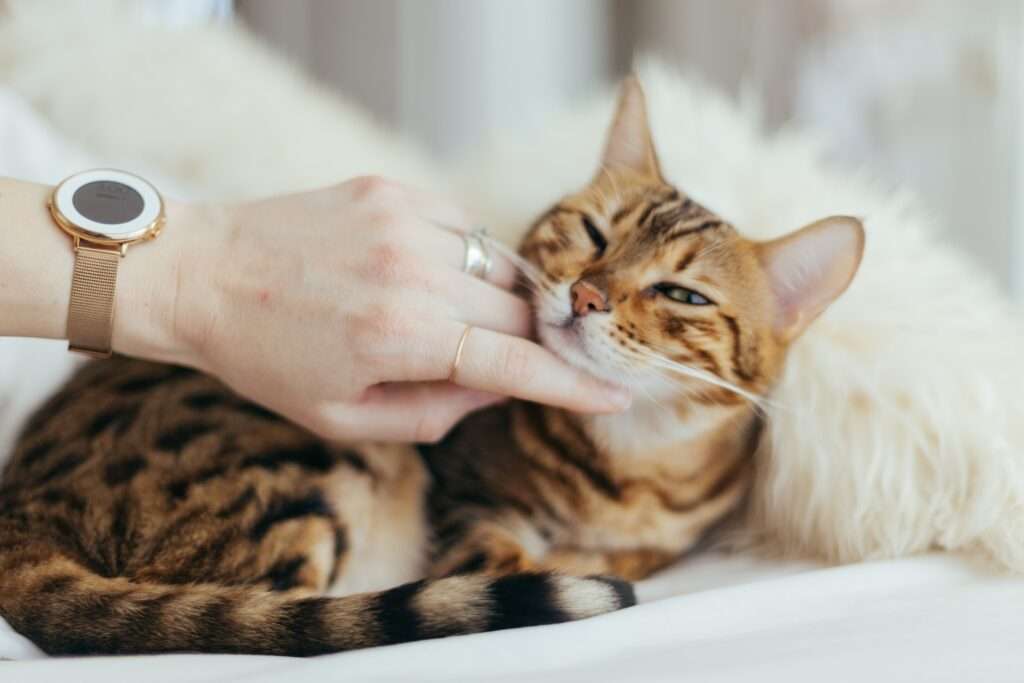Male Cat Behavior After Neutering: A Feline’s Comprehensive Guide
Cats hold a special place in the hearts of many families, making their health and happiness a top concern. One way to achieve this is by neutering your male cat.
Neutering is a surgical procedure that involves the removal of a male cat’s testicles, which effectively halts the production of sperm and reduces the levels of testosterone in their body. This procedure has numerous benefits, including reducing the risk of certain health issues and improving male cat behavior.
In this article, we’ll be discussing male cat behavior after neutering. You’ll learn about the differences between unneutered and neutered male cat behavior, how neutering affects behavior, and tips for helping your cat adjust to his new behaviors.
Unneutered Male Cat Behavior

Unneutered male cats display certain behaviors that can pose challenges for both the feline and their human family members. Testosterone, a hormone present in intact males, can influence their behavior and lead to various issues. It’s important to comprehend these behaviors in order to address them effectively and provide a harmonious living environment for everyone involved.
- Aggression and Dominance: Unneutered male cats are more prone to aggressive behavior, both towards other cats and humans. They may perceive threats more readily or attempt to establish dominance. This aggression can lead to conflicts, injuries, and stress within the household. Addressing and managing this behavior is crucial to ensure a safe and peaceful environment for all.
- Spraying and Marking Territory: One of the most challenging behaviors in unneutered males is urine spraying to mark territory. The strong odor and difficulty in removing urine from surfaces and fabrics can be overwhelming. This behavior is not only inconvenient but can also contribute to tension within the home. Implementing effective strategies to address spraying is essential for a clean and odor-free living space.
- Roaming and the Dangers: Unneutered males often exhibit a strong instinct to roam in search of potential mates. This behavior can result in them venturing far from home, exposing themselves to various risks. They may encounter cars, predators, or engage in fights with other cats, leading to injuries or even getting lost. Understanding the motivations behind roaming and implementing preventive measures is crucial to ensure their safety and well-being.
Solutions and Strategies:
- Neutering: The most effective solution to curb unwanted behaviors in unneutered males is to have them neutered. This procedure reduces testosterone levels and significantly decreases aggression, spraying, and roaming tendencies. Consult with a veterinarian to discuss the appropriate age and timing for neutering.
- Environmental Enrichment: Providing mental and physical stimulation is essential to keep unneutered males engaged and content. Engage them in interactive play sessions, offer puzzle toys, and create vertical spaces to satisfy their natural instincts.
- Territory Management: Help alleviate marking behavior by thoroughly cleaning marked areas with enzyme-based cleaners. Additionally, providing sufficient scratching posts and designated areas for scratching and scent marking can redirect their instincts appropriately.
- Behavioral Training: Consider positive reinforcement training techniques to redirect and modify unwanted behaviors. Reward desirable actions and provide consistent boundaries to encourage good behavior.
- Consultation with a Professional: If the behaviors persist or become challenging to manage, seek advice from a professional animal behaviorist or veterinarian experienced in feline behavior. They can provide tailored guidance and additional strategies specific to your cat’s needs.
Neutered Male Cat Behavior
Neutering is a common procedure for male cats that offers numerous benefits, including positive changes in behavior. By reducing testosterone levels, neutering has a profound impact on male cats, resulting in more amiable, well-adjusted, and manageable companions.
- Reduced Aggression and Improved Social Dynamics: Neutered male cats experience a significant reduction in aggressive behavior towards other cats and humans. This change can lead to a more peaceful and stress-free household, fostering better relationships among all family members, feline and human alike. Neutered males are less likely to engage in territorial disputes, reducing the risk of injuries and creating a calmer living environment for everyone involved.
- Diminished Spraying and Marking Behavior: One of the most noticeable benefits of neutering is the decreased likelihood of urine spraying and marking territory. Unneutered males often exhibit this behavior to establish dominance and communicate their presence. However, after neutering, the urge to mark is greatly reduced. This means you can bid farewell to the pungent odor and the constant battle of cleaning up urine stains, ensuring a fresh and welcoming home for both you and your furry companion.
- Curbed Roaming Tendencies for Enhanced Safety: Neutering significantly diminishes the instinctual drive for intact males to roam in search of mates. By reducing their desire to explore beyond the home, neutered males are at a lower risk of encountering hazards such as traffic accidents, predators, or territorial conflicts with other cats. Keeping your neutered male cat safely within the confines of your home or supervised outdoor spaces provides peace of mind and ensures their well-being.
- Improved Overall Quality of Life: Neutered male cats often exhibit an overall improvement in their well-being. With reduced hormonal influences, they tend to be more content, relaxed, and affectionate. Neutered males may display less disruptive behaviors, allowing for a better bond and increased enjoyment of shared activities. Their newfound calmness can contribute to a harmonious household, making them a joy to be around and enhancing the overall quality of life for both cat and owner.
Changes in Behavior After Neutering
Neutering is a beneficial procedure for male cats, promoting their overall health and reducing unwanted behaviors. While the primary focus is often on the pre-neutering behavior, it’s essential to recognize that behavioral changes can occur after the surgery as well. Understanding these post-neutering behavior changes will help you provide the necessary support and create a smooth transition for your feline companion.
- Decreased Energy Levels and Activity: One common change in behavior after neutering is a decrease in energy levels and activity. With the reduction in testosterone levels, neutered male cats may become less active. They may spend more time resting or enjoying leisurely activities rather than engaging in vigorous play. It’s important to provide appropriate outlets for mental and physical stimulation, such as interactive toys and environmental enrichment, to ensure they stay mentally stimulated and maintain a healthy weight.
- Changes in Eating Habits: Some neutered male cats may experience changes in their eating habits after the surgery. While individual responses may vary, it’s not uncommon for cats to exhibit an increased appetite or altered food preferences. Keep a close eye on their food intake and adjust their diet accordingly to prevent excessive weight gain. Consult with your veterinarian to determine the appropriate portion sizes and feeding schedule to maintain their overall health and well-being.
- Shifts in Social Behavior: Neutering can also influence a male cat’s social behavior towards other cats and humans. With the reduction in testosterone, some cats become more sociable and affectionate towards both feline companions and their human family members. They may seek more interaction, enjoy being petted, or even show increased interest in bonding with other cats in the household. However, it’s important to note that neutered males might also become more submissive and less assertive in their interactions. This change in social dynamics can contribute to a more harmonious environment, but it’s crucial to monitor the dynamics between cats and ensure that all individuals are comfortable and at ease.
These behavior changes are normal and should be expected after neutering. It’s important to be patient and provide your cat with a safe and comfortable environment as they adjust to their new behaviors. In the next section, we’ll discuss tips for helping your cat adjust after neutering.
Helping Your Cat Adjust After Neutering

Neutering is a significant event in a male cat’s life, and providing the right support during their recovery and adjustment period is crucial. After the surgery, your cat may experience physical discomfort and behavioral changes. By following a few simple tips, you can ensure a smooth transition and help your cat adapt to their new behaviors after neutering.
- Creating a Comfortable Environment: After surgery, it’s essential to create a comfortable and safe environment for your cat to recover in. Set up a quiet and cozy space where they can rest undisturbed. Provide a soft bed, access to fresh water, and litter box nearby for their convenience. Minimize noise and stressors in the environment to promote a calm and peaceful atmosphere that aids in their healing process.
- Monitoring Food Intake: Neutered male cats may experience changes in their appetite after surgery. Some cats may develop an increased appetite, while others may have a decreased interest in food temporarily. Monitor their food intake closely and adjust their diet accordingly to prevent excessive weight gain or loss. Consult with your veterinarian for guidance on portion sizes and appropriate nutrition to maintain their overall health.
- Offering Attention and Playtime: Post-neutering, many male cats become more sociable and affectionate towards their human companions. Take advantage of this newfound desire for attention and spend quality time with your cat. Engage in interactive play sessions using toys they enjoy, and provide ample opportunities for gentle petting and cuddling. Not only will this strengthen your bond, but it will also help alleviate any anxiety or restlessness they may experience during the adjustment period.
- Patience and Understanding: Adjusting to new behaviors takes time and patience. Your neutered male cat may undergo personality changes as their hormone levels stabilize. They might become more relaxed or display different social tendencies. Be patient with their adjustment process and avoid placing unrealistic expectations on their behavior. Provide reassurance and a supportive environment, allowing them to adapt at their own pace.
- Monitoring for Any Concerns: While most cats recover smoothly from neutering, it’s important to monitor them closely for any signs of complications. Keep an eye on the surgical site for any signs of infection or excessive swelling. If you notice any concerning symptoms, such as loss of appetite, lethargy, or behavioral changes that persist beyond the initial recovery period, consult with your veterinarian promptly.
Conclusion
Neutering your male cat is a vital step towards improving their behavior and overall well-being. By reducing testosterone levels, this procedure can effectively address problematic behaviors such as aggression, spraying, and roaming.
While there may be some adjustments during the transition period, with patience and attentive care, your cat will adapt to their new behaviors, leading to a happier and healthier life for both of you. Neutering not only creates a more harmonious home environment by reducing conflicts, but it also strengthens the bond between you and your cat.
Additionally, by choosing to neuter, you contribute to responsible pet ownership by helping control the feline population and reducing the number of homeless cats. Make the responsible choice of neutering your male cat to ensure their long-term health, improved behavior, and a brighter future together.
Frequently Asked Questions
Q: Will neutering completely eliminate aggressive behavior in my male cat?
A: Neutering can significantly reduce aggressive behavior in male cats, but it may not eliminate it entirely. Each cat is unique, and factors such as individual temperament and past experiences can influence behavior. If your cat continues to display aggression after neutering, it’s best to consult with a veterinarian or a professional animal behaviorist for further guidance.
Q: How long does it take for behavior changes to occur after neutering?
A: The hormonal changes after neutering typically take a few weeks to fully manifest in a cat’s behavior. However, it’s important to note that individual cats may have different adjustment periods. Some behavior changes may be noticeable immediately after surgery, while others may take a bit longer to become apparent.
Q: Will neutering my male cat make him gain weight?
A: Neutering can slightly increase the risk of weight gain in male cats. The decrease in testosterone levels can lower their metabolism, making them more prone to weight gain if their food intake is not properly monitored. It’s crucial to provide a balanced diet and adjust portion sizes to prevent excessive weight gain. Regular exercise and mental stimulation through play can also help maintain a healthy weight.
Q: Can neutered male cats still mate or impregnate female cats?
A: Neutering is a surgical procedure that removes the testes, which are responsible for producing sperm and testosterone. Once a male cat is neutered, he is unable to reproduce or impregnate female cats. Neutering is an effective method of preventing unwanted litters and reducing the overall cat population.
Q: Can neutered male cats still spray urine?
A: Neutering significantly reduces the likelihood of urine spraying in male cats. However, in some cases, cats may continue to display this behavior even after neutering, especially if it was an established habit prior to the surgery. If urine spraying persists or becomes an issue, consulting with a veterinarian or a professional behaviorist can help address the underlying causes and provide guidance for managing the behavior.
Q: Can neutering affect my male cat’s personality?
A: Neutering generally leads to positive changes in a male cat’s behavior. They may become more relaxed, less aggressive, and more sociable. However, it’s important to remember that personality traits can vary among individual cats. Neutering helps to reduce hormone-driven behaviors but does not alter a cat’s fundamental personality or temperament.
Remember, if you have specific concerns or questions about your male cat’s behavior after neutering, it’s always best to consult with a qualified veterinarian or animal behaviorist who can provide personalized advice and guidance based on your cat’s unique needs.
References
- American Veterinary Medical Association. (n.d.). Spay/Neuter: What to Expect. Retrieved from https://www.avma.org/resources/pet-owners/petcare/spaying-and-neutering
- The Humane Society of the United States. (n.d.). Pet Neutering. Retrieved from https://www.humanesociety.org/resources/why-you-should-spayneuter-your-pet
- American Society for the Prevention of Cruelty to Animals. (n.d.). Spay/Neuter Your Pet. Retrieved from https://www.aspca.org/pet-care/general-pet-care/spayneuter-your-pet
- Johnson-Bennett, P. (2011). Think Like a Cat: How to Raise a Well-Adjusted Cat – Not a Sour Puss. Penguin Books.
- Moore, A. (2007). The Cat Behavior Answer Book: Practical Insights & Proven Solutions for Your Feline Questions. Storey Publishing.





